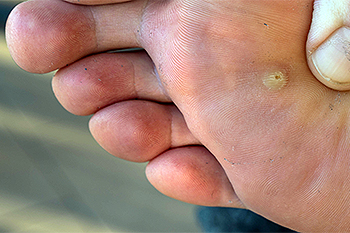Garner (919) 661-4150
Plantar Warts in Children
Tuesday, 24 May 2022 00:00
Warts are areas of hardened skin that typically have a bumpy surface. They come in various sizes, shapes, and colors and can appear anywhere on the body. Plantar warts occur on the bottom of the feet. Children get them more often than adults. Viruses from the human papillomavirus (HPV) cause warts. Kids can get warts from touching a towel or surface that someone else with a wart has used and pick up HPV. Warts thrive in warm, moist environments like the feet. Plantar warts can grow for a long time before they are visible. Walking barefoot in public places and not cleaning and drying the feet well regularly makes one more susceptible to plantar warts. These warts can cause considerable discomfort and feel like there is a rock in one’s shoe. One should not pick at, rub, or scratch a wart. Most of the time, these warts will go away on their own, but they can recur. Plantar warts can be treated with medicine containing mild acid that removes dead skin cells on the wart, cryosurgery - where the doctor uses a chemical repeatedly across a few weeks to freeze the wart and kill the virus, or other means of removing the wart. It is a good idea to take your child to a podiatrist to have the plantar wart treated and not try to remove it on your own.
Plantar warts can be very uncomfortable. If you need your feet checked, contact Chukwuma Ukata, DPM from Advanced Carolina Foot and Ankle Center. Our doctor will assist you with all of your foot and ankle needs.
About Plantar Warts
Plantar warts are the result of HPV, or human papillomavirus, getting into open wounds on the feet. They are mostly found on the heels or balls of the feet.
While plantar warts are generally harmless, those experiencing excessive pain or those suffering from diabetes or a compromised immune system require immediate medical care. Plantar warts are easily diagnosed, usually through scraping off a bit of rough skin or by getting a biopsy.
Symptoms
- Lesions on the bottom of your feet, usually rough and grainy
- Hard or thick callused spots
- Wart seeds, which are small clotted blood vessels that look like little black spots
- Pain, discomfort, or tenderness of your feet when walking or standing
Treatment
- Freezing
- Electric tool removal
- Laser Treatment
- Topical Creams (prescription only)
- Over-the-counter medications
To help prevent developing plantar warts, avoid walking barefoot over abrasive surfaces that can cause cuts or wounds for HPV to get into. Avoiding direct contact with other warts, as well as not picking or rubbing existing warts, can help prevent the further spread of plantar warts. However, if you think you have developed plantar warts, speak to your podiatrist. He or she can diagnose the warts on your feet and recommend the appropriate treatment options.
If you have any questions please feel free to contact our office located in Garner, NC . We offer the newest diagnostic and treatment technologies for all your foot and ankle needs.






